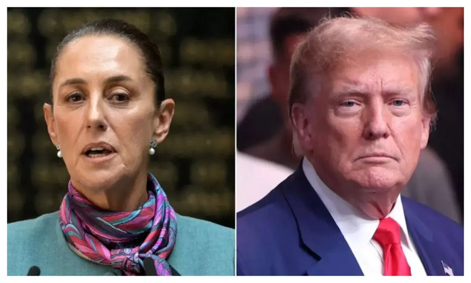|
|
|
|
|
|
 |
|
|
US
President
Donald
Trump
has said
that
Mexican
President
Claudia
Sheinbaum
turned
down his
offer to
send
United
States
troops
into
Mexico
to help
battle
drug
cartels
because
she was
“too
afraid”
of the
cartels
to
accept
his
proposal. |
| |
Trump
says
Mexican
President
rejected
U.S.
military
aid to
combat
cartels
Agustina
Lopez
Castro -
Mexico
Tell Us
Mexico
WASHINGTON
-
President
Donald
Trump
said
Sunday
that
Mexican
President
Claudia
Sheinbaum
rejected
his
proposal
to send
U.S.
troops
to
Mexico
to help
combat
the
illegal
drug
trade,
claiming
she is
fearful
of the
country’s
powerful
cartels.
Trump’s
remarks
followed
Sheinbaum’s
confirmation
that he
had
urged
her
during a
phone
call
last
month to
allow a
greater
role for
the U.S.
military
in
fighting
drug
cartels
within
Mexico.
Acknowledging
that he
had
suggested
deploying
troops,
Trump
criticized
Sheinbaum
for
dismissing
the
idea.
“Well,
she’s so
afraid
of the
cartels
she
can’t
even
walk—so
you know
that’s
the
reason,”
Trump
told
reporters
aboard
Air
Force
One on
Sunday.
“And I
think
she’s a
lovely
woman.
The
president
of
Mexico
is a
lovely
woman,
but she
is so
afraid
of the
cartels
that she
can’t
even
think
straight.”
Rising
U.S.
Military
Presence
at the
Border
In
recent
months,
the U.S.
military
presence
along
the
southern
border
has
steadily
increased,
following
Trump’s
January
directive
to
expand
the
army’s
role in
stemming
the flow
of
migrants.
The U.S.
Northern
Command
has
ramped
up troop
deployments
and
equipment
along
the
border,
intensified
aerial
surveillance
of
fentanyl
trafficking
routes,
and
sought
expanded
authority
for U.S.
Special
Forces
to
collaborate
with
Mexican
forces
in
operations
against
cartels.
Despite
this
escalation,
Sheinbaum
firmly
rejected
Trump’s
suggestion
of U.S.
military
intervention
within
Mexico’s
borders.
“He
said,
‘How can
we help
you
fight
drug
trafficking?
I
propose
that the
United
States
military
come in
and help
you.’
And you
know
what I
said to
him?
‘No,
President
Trump,’”
Sheinbaum
said on
Saturday.
“Sovereignty
is not
for
sale.
Sovereignty
is loved
and
defended.”
Sheinbaum
emphasized
that
while
both
countries
could
collaborate
on
security
efforts,
operations
must
remain
within
their
respective
territories.
Tensions
Over
U.S.
Policy
on
Cartels
In
February,
Trump
designated
several
gangs
and
cartels
smuggling
drugs
into the
U.S. as
foreign
terrorist
organizations,
restricting
their
activities
and
providing
law
enforcement
with
additional
resources
to
combat
them.
However,
Sheinbaum’s
refusal—and
Trump’s
pointed
response—signal
potential
friction
between
the two
leaders,
despite
early
cooperation
on trade
and
immigration
during
Trump’s
second
term.
Trump
maintained
that
U.S.
military
assistance
was
necessary
to curb
fentanyl
trafficking.
“They
are bad
news,”
he said
of the
cartels.
“If
Mexico
wanted
help
with the
cartels,
we would
be
honored
to go in
and do
it. I
told her
that—I
would be
honored
to go in
and do
it. The
cartels
are
trying
to
destroy
our
country.”
The
White
House
has also
tied its
efforts
to curb
fentanyl
trafficking
to
Trump’s
broader
tariff
strategy,
saying
he aims
to hold
Mexico,
Canada,
and
China
accountable
for
limiting
the
drug’s
flow
into the
U.S.
|
|
|
|
|
|
|
|
|